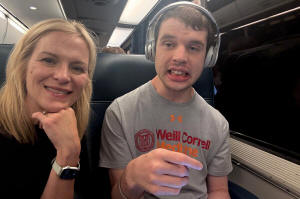Trump's comments on autism evoke anger and hope among autistic people
and their families
[September 29, 2025]
By LAURA UNGAR
An Indiana woman with an autistic son says President Donald Trump was
blaming moms when he made unfounded claims that taking Tylenol while
pregnant causes autism.
A Kentucky woman diagnosed with the condition as an adult thought Trump
was villainizing autism by describing it as a “horrible, horrible
crisis.”
A Massachusetts man whose twin boys have profound autism found the
Republican president's words hopeful because it was the first time the
father had seen autism discussed at the highest levels of government.
Recent comments about autism by the Republican president and others in
his administration are rippling through the United States, stirring up a
wide range of views and feelings among autistic people and their
families. Some welcome the renewed focus and pledges of research money
for the complex developmental condition. Others are outraged by what
they consider the blaming, shaming and spreading claims not grounded in
science.
On Monday, Trump repeatedly warned pregnant women not to take Tylenol,
known by the generic name acetaminophen, and he fueled discredited
claims about autism and vaccines. Some studies have raised the
possibility that taking acetaminophen in pregnancy might be associated
with a risk of autism. Many others, however, have not found a connection
and no causal link has been proved.
Meantime, scientists stress that concerns that vaccines could be linked
to autism have been long debunked. A fraudulent study claiming a link
between the measles, mumps and rubella vaccine was later retracted by
the journal that published it. Science has shown autism is mostly rooted
in genetics.

Pushback on blaming mothers, villaining autism
Dr. Noa Sterling, an OB-GYN, said Trump’s comments, particularly about
Tylenol, touched a nerve for many parents of young autistic children.
“There’s this kind of narrative that you have to be careful of
absolutely everything you do in pregnancy, and if you eat the wrong
thing or do the wrong thing, you’re going to irreparably harm your
baby,” she said. “So the Tylenol just plays directly into this fear
that, ‘I’ve taken something that has caused this condition in my
child.’”
Dani Derner, who has a 4-year-old autistic son, said it is “really
disappointing" that women are being blamed.
“I personally did not take Tylenol during my pregnancy,” said Derner, of
Dripping Springs, Texas. But, she said, “some women might not have a
choice."
Some women said the blaming was reminiscent of the disproven mid-20th
century theory that emotionally cold “refrigerator mothers” caused
autism.
“When I heard that he said acetaminophen was the cause, I was a little
scared and a little sad because as a mom of a child with autism, I felt
like maybe I was being blamed for that,” said Rachel Deaton of Fishers,
Indiana, who has a 22-year-old autistic son. “We really don’t know what
causes autism.”
Kelly Sue Milano of Fullerton, California, who has an autistic son,
added: “A lot of responsibility and at times criticism is placed on
mothers, I think, in a really unbalanced and unfair way.”
Some autistic people recoiled at the notion that autism is something to
cure.
“It is part of who we are,” said Dani Bowman, CEO of DaniMation
Entertainment and a cast member of “Love on the Spectrum.” “My mom never
took Tylenol while she was pregnant with me or my sister. My dad has
autism. My sister has autism. I have autism."
[to top of second column]
|

This photo provided by Judith Ursitti, cofounder and president of
the Profound Autism Alliance, shows her with her son, Jack, who is
autistic, in New York on Sunday, Aug. 3, 2025. (Judith Ursitti via
AP)
 Katy Thurman, a legal assistant in
Lexington, Kentucky, who was diagnosed with autism as an adult, grew
angry at the concept of eradicating autism.
“There are actual crises going on in this country. People being
autistic is not one of them,” Thurman said.
Addressing profound autism
Others were encouraged by the attention on the developmental
disorder.
“We need a voice at the table and we have to do something,” said
Matt Murphy of Ayer, Massachusetts, who has twin 8-year-old boys
with profound autism. “That’s the hopeful thing I take out of this
-– finally, the top level of government is talking about this.”
He said people with profound autism will need lifetime support, and
federal and state governments will need to take action in many
areas, including education and housing. Murphy is glad to see
federal money going toward research into autism’s causes.
“Even if you find the cause … we still have the current population
that we need to support and address and help,” he said.
Deaton, who has an adult autistic son, agrees, but worries about
federal cuts affecting things such as Medicaid and special
education. Those help autistic people contribute to society, get
jobs and be taxpayers, she said.
Judith Ursitti leads the Profound Autism Alliance and was among a
group of people who met with the director of the National Institutes
of Health in June. She said hearing the term “profound autism” in a
White House event was validating and she was pleased with the list
of research being funded.
But Ursitti, mother of a 22-year-old son with autism, realizes that
people on other parts of the autism spectrum found some of the
language hurtful and that others in her community were outraged
because they believe moms were being blamed.
Ursitti also said some of the discussion was confusing, including
the failure to tease out profound autism from other parts of the
spectrum when mentioning the statistic that 1 in about 31 children
is affected by autism spectrum disorder in the U.S.

“The vast majority of people with autism don’t fall into that
profound category,” she said.
She said reactions to comments made at the White House were in some
ways as diverse as the autism community itself.
“There's a divide that’s quite similar to what we’re seeing in our
country, honestly,” she said.
___
Associated Press video journalists River Zhang and Nathan Ellgren in
Washington and Obed Lamy in Indianapolis contributed to this report.
All contents © copyright 2025 Associated Press. All rights reserved |